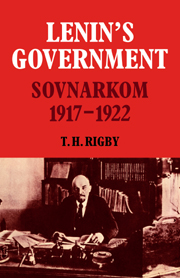Book contents
- Frontmatter
- Contents
- Tables
- Preface
- Acknowledgements
- Abbreviations
- Part One SMOLNY: SOVNARKOM TAKES SHAPE
- Part Two THE KREMLIN: SOVNARKOM IN ACTION
- Part Three OF MEN AND INSTITUTIONS
- 9 The system and the chief
- 10 The people's commissars: recruitment
- 11 The people's commissars: personal background
- 12 Government, soviets and party
- 13 Props for an ailing chairman
- 14 The last months
- 15 Some historical reflections
- Appendix A
- Appendix B
- Notes
- Bibliography
- Index
- Plate section
11 - The people's commissars: personal background
Published online by Cambridge University Press: 05 November 2011
- Frontmatter
- Contents
- Tables
- Preface
- Acknowledgements
- Abbreviations
- Part One SMOLNY: SOVNARKOM TAKES SHAPE
- Part Two THE KREMLIN: SOVNARKOM IN ACTION
- Part Three OF MEN AND INSTITUTIONS
- 9 The system and the chief
- 10 The people's commissars: recruitment
- 11 The people's commissars: personal background
- 12 Government, soviets and party
- 13 Props for an ailing chairman
- 14 The last months
- 15 Some historical reflections
- Appendix A
- Appendix B
- Notes
- Bibliography
- Index
- Plate section
Summary
The biographies of Sovnarkom members in Lenin's day show a wide diversity of social origin, education and life-experience. One might imagine this heterogeneity to have been moderated, if not negated, by the fact that they were all revolutionary Marxists. For was not participation in the Bolshevik movement the supreme formative experience for all of them, did not the fires of the revolutionary struggle melt the native ore of their original social personalities and identities and form them in a common mould? But this can scarcely be maintained either. Revolutionary Marxists who had achieved some prominence in the Russian Social-Democratic Labour Party they indeed all were, but their modes of being Marxists and of being revolutionaries were as varied as the other aspects of their biographies. Indeed, when one considers the many Sovnarkom members who found themselves amongst the supporters of multi-party government in 1917, the Left Communists in 1918, the Workers' Opposition or Democratic Centralists in 1920–1, or of the various opposition groupings of the middle and later 1920s, it is immediately apparent that those serving in Lenin's government had most diverse notions as to what the Revolution was about and how to create a socialist society. Behind this diversity of conviction lay the most varied political biographies.
It was a diversity that extended both to the experience and qualities of personality that first brought them into the revolutionary movement, and to the lives they led and the political positions they adopted after they had joined.
- Type
- Chapter
- Information
- Lenin's GovernmentSovnarkom 1917-1922, pp. 142 - 159Publisher: Cambridge University PressPrint publication year: 1979



